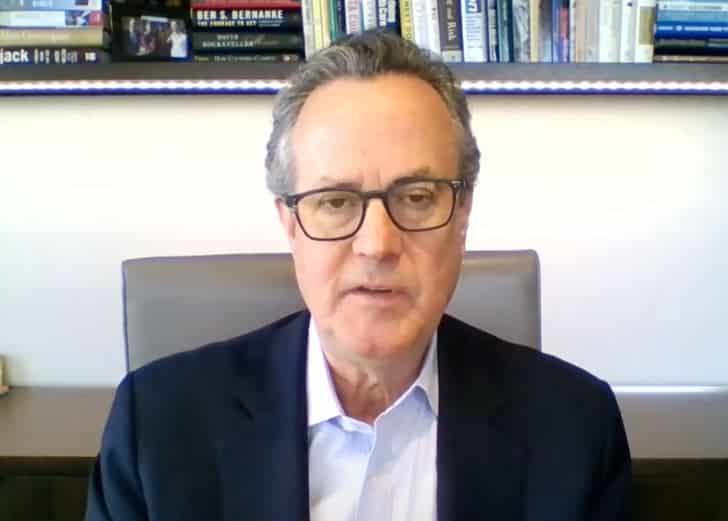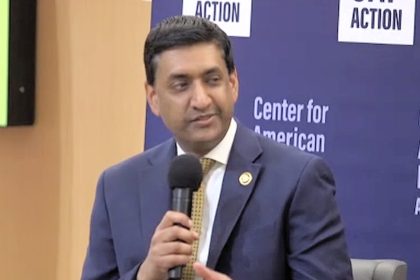Europe Leading the Charge on ESG but Coordination Needed

WASHINGTON — Investment markets around the world are realizing that a short-term focus on purely financial goals is no longer sufficient. But as the momentum behind environmental, social, and governance builds, it’s the European Union that is really leading the charge, launching a series of reforms in the sustainable finance space that are already reshaping how financial and non-financial firms are going to operate.
“The letters ESG [standing for Environmental, Social, and Corporate Governance] are probably [among] the most commonly described, least understood three letters in the English language these days,” Jason Grumet, founder and president of the Bipartisan Policy Center admitted as he gathered policymakers and corporate leaders to discuss ESG activity in the EU and how it may impact U.S. companies and global actions in the future.
Still, 85% of companies in the S&P 500 currently have a sustainability report they issue that includes information about investments such as climate disclosures and diversity and inclusion statistics. These reports are not consistent, however. Nor is some of the information truly measurable.
“There is kind of an alphabet soup out there of many different organizations over the years that have started to come up with ratings, reporting, disclosure standards, etc.,” Doug Peterson, president and CEO of S&P Global explained. But while over time the U.S. has seen what he called a “convergence of many organizations from the alphabet soup coming together to come up with standards around disclosure,” the EU has been busy codifying sustainability goals that have the potential to be adopted as the framework for international standards.
“Global institutions with operations in the EU will start operating under [EU] standards,” Peterson said. “We need to also start accelerating this discussion in the U.S. so we don’t get left behind… [or] let Europeans set all the standards. But we really should be at that table doing it together.”
In what David Henry Doyle, head of Government Affairs & Public Policy for Europe, Middle East, and Africa at S&P Global called “the bedrock of the EU sustainable finance agenda,” the EU passed the EU Taxonomy in 2020. This hefty 550-page document, with more to come, is a nascent classification system for economic activities with definitions and rules to determine which activities are environmentally sustainable.
“It was… suggested as a key component to provide an answer to what seems like a simple question but isn’t: How do investors know with confidence which economic activities are sustainable?” Doyle said.
He added that taxonomy could both address the need for a framework and the growing problem of greenwashing — conveying the false impression or providing misleading information about the environmental friendliness of a company’s products or services — and impose some disclosure requirements to fill in a data gap.
Yet the EU hasn’t stopped at establishing definitions. In what may be the broadest regulatory action in sustainable finance to date, in March of 2021 the EU passed its Sustainable Finance Disclosure Regulation to drive money toward sustainably-oriented investments.
The SFDR has increasingly detailed reporting obligations with an end goal toward normalizing sustainability considerations in financial disclosures. Among the reporting provisions is the required disclosure of a fund’s approach to incorporating sustainability into investment decisions, disclosure of any adverse impacts that investments may have on environmental or social factors and disclosure of sustainability risks that could impact an investment’s performance.
Additional measures are being considered in the EU to amend rules for specific financial markets, and some EU countries have proposed regulating ESG rating providers and other third-party entities that investors rely on.
But while these efforts have importance, they may be very difficult to apply outside of Europe, with some data hard to screen for outside of the EU.
“We’re going to have to make sure that systems can operate in a global manner,” Tom Quaadman, executive vice president of the Center for Capital Markets Competitiveness at the U.S. Chamber of Commerce reminded, stressing that the discussion extends beyond the U.S. and EU into Asia and emerging markets as well.
“Businesses operate globally… and capital flows around the world now,” Quaadman said.
“There are going to be differences between the U.S. and EU, and the U.S. and others, when we start to actually come out with some of these different rules,” Quaadman warned, so it is
critical that U.S. policymakers and corporate leaders have a grasp of what Europe is doing and what the implications could be for American companies not only because U.S. subsidiaries in Europe will have to comply, but also because “the issue becomes coordination.”
Kate can be reached at [email protected].
























